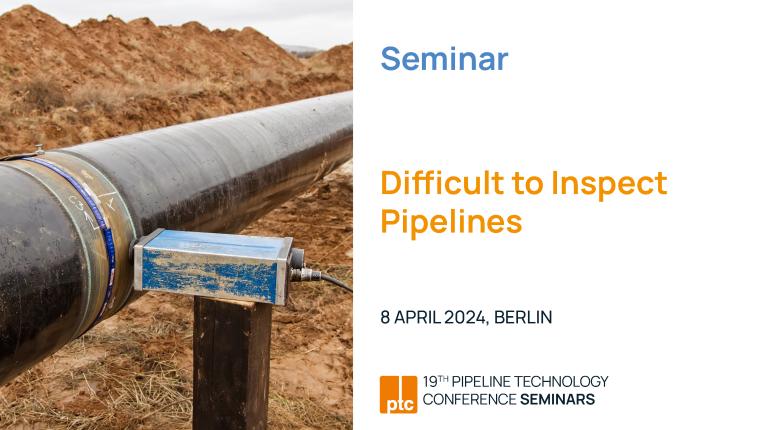Difficult to Inspect Pipelines
Approval (for German Engineers)
The seminar "Difficult to Inspect Pipelines" is recognized as a training session in accordance with §6 FuWo. Consulting engineers and engineers of the German Chambers of Engineers receive 8.00 training points for participation.
Course Content
1 Onshore and Offshore Pipelines
1.1 Terminologies (piggable vs. unpiggable, challenging and difficult to inspect)
1.2 Scenarios (Accessibility, Is external inspection an option?)
- Onshore scenarios (CUI, external sheeting, Casings, Materials)
- Offshore scenarios - Riser – (Static Riser, Catenary Risers, Flexible Risers) - Flowlines and unpiggable subsea pipelines
2 Methods of Inspection
2.1 Inspection Technology
- Electromagnetic Technology (MEC, PEC, Eddy Current, etc.)
- UT Technology (TOFD, EMAT, etc.)
- Others (Radiography, optical,...)
2.2 Operation of inspection tools
- Deployment of external inspection equipment Offshore and Onshore
- Internal inspection using - Crawler, How to propel, How to get back - Tethered tools
- External Inspection, How to get through the coating? How to scan long distances
3 Preparation
- Planning (Who is involved, What to do at what time)
- Cleaning (Internal vs. External Cleaning)
- Deployment (LARS, Navigation, etc)
4 Inspection Solutions
4.1 Actual Solutions of various vendors
Pre-School (optional)
Before your training on 'Difficult to Inspect Pipelines' with Konrad Reber begins, ROSEN's Competence Club, the premier learning and collaboration platform for the pipeline industry, is available for your use at no additional cost. This platform provides four complimentary pre-seminar e-learns that are designed to support you in acquiring the prerequisite knowledge for the course and enhancing your awareness level skillset. The e-learn training lasts a total of 7.5 hours and can be completed at your own pace and at a time that is convenient for you. The Competence Club training will cover:
- Introduction to Pipeline Defect Assessment CS020A (5 hours): You will gain an awareness of pipeline defect assessment methods (for all types of defects found in pipelines) and fatigue assessment, with a basic understanding of fracture mechanics. Learn more.
- Introduction to Onshore Laws, Regulations and Standards CS006A (35 minutes): Develop an awareness of legislation, regulations and standards used at all stages of the onshore pipeline lifecycle, giving you an understanding of the duties of a pipeline engineer to achieve legislative compliance. Learn more.
- Introduction to Pipeline Defects CS048A (1 hour): Develop an awareness of the different types of defects that can appear in pipelines, their causes and the threats they pose to the pipeline. Learn more.
- Introduction to Probability of Failure Analysis CS044A: (1 hour): Gain an awareness of various pipeline hazards that may lead to loss of containment and learn how to assess the probability of failure, from qualitative to quantitative analysis. Learn more.
Plus, as a referral member of ptc, you will have the chance to pick a complimentary e-learn course of your liking when you access your pre-school training through the Competence Club.
No special prerequisites, but technical understanding. Target Group: Onshore and Offshore Integrity Engineers working with Operators, Integrity Consultants, Service Providers and Classification/Certification Bodies.
Konrad Reber studied physics at the University of Mainz with a focus on Solid State Physics. In a Ph.D. thesis at the material science department of the University of Erlangen, he worked in the field of magnetic materials, in particular the measurement of material parameters using magnetic stray flux methods. At Pipetronix (now part of Baker-Hughes) he was responsible for the development of data analysis algorithms for the application to MFL-pipeline inspections. Later he also became responsible for the magnetic design of MFL-inspection pigs. After changing to NDT Systems & Services (now NDT Global) he continued to work in the field of in-line inspection and broadened his focus to include topics of defect assessment and general comparison methods of different inspection tools. Between 2006 and 2008 he was with TUVRheinland as an expert within the Pipeline Technology Group. He was responsible for international projects on pipeline integrity and pipeline certification. Starting 2008 he was head of research and development for the Innospection Group. The department was responsible for designing new inspection equipment for the Oil and Gas industry. He continued this position for Innetiqs in 2022. His focus is on the development and refinement of testing technologies with applications for underwater or otherwise difficult to inspect structures. He is busy in delivering speeches on conferences and is a trainer in various courses on pipeline inspection.
Seminars Contact


